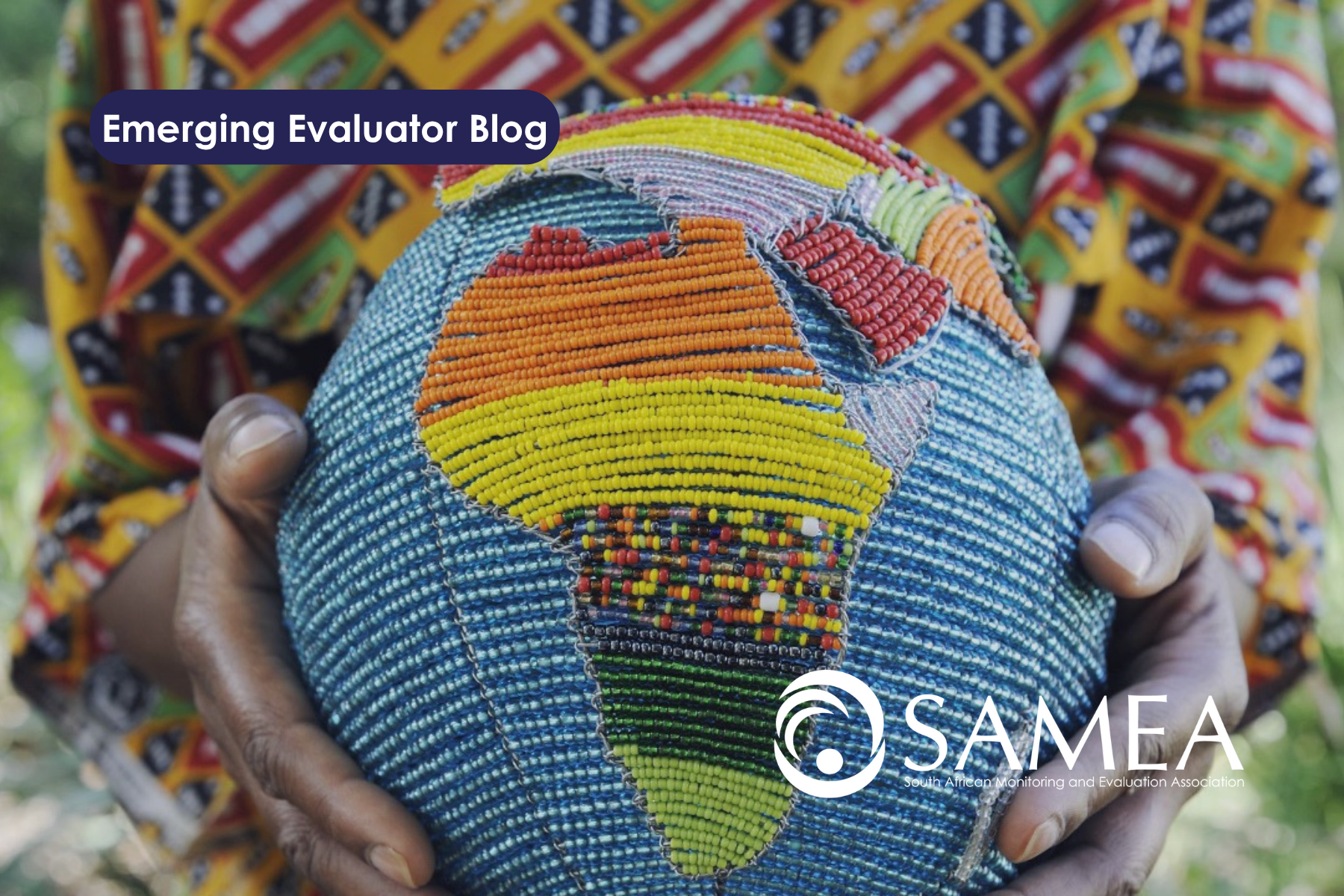Examples of Made in Africa Evaluation Principles in African Communities

Blog by Tshidi Moilwa – Emerging Evaluator at SAMEA (2024)
Introduction
As the field of evaluation evolves, we still see how current models of evaluation are still Westernised and business as usual, a process that “leaves people behind.” During the SAMEA 2024 9th Biennial Conference, a presentation was made in the Made in Africa Evaluation (MAE) strand on “Strengthening IKS in enhancing MAE”. In this blog, I intend to not only re-enforce the importance of this thinking but take it further by illustrating case studies where Indigenous Knowledge Systems (IKS) expressions have been implemented in African communities
The presentation gives context to how MAE focuses on evaluation approaches that are rooted in African realities and contexts using African knowledge systems and how IKS refers to systems of knowledge developed by local communities drawing on historical, environmental and cultural insights. Hence the importance of integrating IKS in MAE, to enhance the relevance of evaluation practices in Africa. The African Evaluation Principles (AEP) complement other international evaluation guidelines and standards, but take a distinguishing direction at the fork of mainstream evaluation criteria and African focussed evaluation tenets of measurement. . The MAE AEPs challenge the current practices of designing evaluation tools that have historically overlooked African contexts.
Indigenised evaluations differentiate evaluation approaches, methods and tools as informed by beneficiaries. An ethnographic approach to evaluation has proven to be a practical path to integrating IKS into MAE. This approach offers a more comprehensive understanding of the cultural, environmental and community values that influence development interventions, fosters local ownership of development programmes and results are more reflective of local realities. The context and condition in which evaluations are carried out matters in that they help identify which evaluation approaches provide the highest quality, and most actionable evidence.
There are several examples where indigenous concepts have been adapted into intellectual spaces:
South Africa’s ‘lekgotla’
The first example is South Africa’s use of the phrase ‘lekgotla’ traditionally defined as a community gathering and deliberation on a specific agenda to reach consensus. Politically, a cabinet lekgotla means a democratically structured meeting where members of cabinet convene to discuss or resolve a specific agenda. The use of the term is based on an ‘indigenous practice of problem resolution’(1). In a lekgotla, the community actively engages in the entire research process from initiation to its ultimate resolution. In a programme evaluation context, a lekgotla can build ownership, trust between the evaluator and the community, and this empowerment may enable the community to take ownership and become the authors of the research project and the researcher becomes the co-author through the experiences and the eyes of the community(2). This is one example of the abundant room of incorporating endogenous methods into evaluation practices.
Uganda’s Barazas Programme
Uganda provides a second example of a traditional practice that has been incorporated into the country’s decentralisation policy framework. In 1992, Uganda began to introduce a decentralisation policy in which the central government cedes some of its power to local government to carry out part of its mandates on its behalf. The implementation of the Barazas programme served as a platform for technical officers and political leaders to provide evaluative information about the status of service delivery to the citizens and in turn paving the way for citizens to participate in the development cycle by monitoring the usage of public funds and resources. Uganda’s decentralisation concept of a more appropriate Africa-rooted programme evaluation management model, that explicitly places the evaluation agenda in the Barazas. This is at the core of the Baraza initiative is in Uganda but more importantly at the centre of advancing Made in Africa evaluation approaches(3).
South Africa’s #FeesMustFall Movement
A trigger in decolonial thinking and by extension of MAE in South Africa, was the 2015 #FeesMustFall movement. It called for, amongst others, the decolonisation and transformation of the education curriculum. There is a realisation that South African universities emerged from the colonial project, therefore research was specifically focused on promoting the colonial agenda. This coupled with the push for transformation in universities acknowledged that African knowledge systems cannot exist in isolation from global systems, and that bodies of knowledge continually influence one another. The outcome of decolonised curricula provides an opportunity for indigenous African knowledge systems to gain recognition among the array of knowledge systems in the world(4).
These examples illustrate three distinctive components that are crucial in Made in Africa models: the use of indigenous knowledge systems, the process of ensuring that evaluations are led by local actors and that evaluations are localised, based on mutual respect.
The concept of IKS is at the heart of MAE. There is little literature on how we achieve MAE, but the examples listed in this blog display how IKS is at the forefront of socio-political practices in African communities and its implications for MAE practices. There are more examples such as the ones listed, these need to be documented as evidence of best practices. MAE is still a growing concept, but the landscape of what can be achieved is a positively hopeful opportunity on how to transform mainstream evaluation practices.
References
[1] (Mbava and Chapman 2020)
[2] (Porter and Goldman 2013)
[3] (Watera 2019)
[4] (Constandius, et al. 2018)
Bibliography
Mbava, and Chapman. 2020. “Adapting realist evaluation for Made in Africa evaluation criteria.” African Evaluation Journal 1-12.
Porter, S, and I Goldman. 2013. “A growing demand for Montoring and Evaluation in Africa.” African Evaluation Journal 1-9.
Watera, J. 2019. “Indenizing Citzen-Bases M&E Mechanisms in Africa: Lessons from Uganda’s Barazas.” eVALuation Matters 1-10.
Constandius, Nell, Alexandra, Blackie, Malgas, Setati, and McKay. 2018. “#Feesmustfall and decolonising the curriculum.” South African Journal of Higher Education 65-85.
AfrEA. 2021. African Evaluation Principles. November. https://afrea.org/AEP/new/The-African-Evaluation-Principles.pdf.
Most Recent Read
Discover more topics
